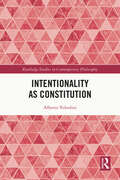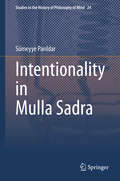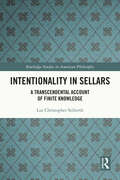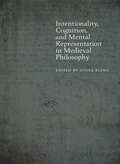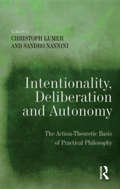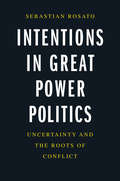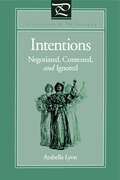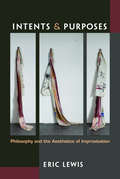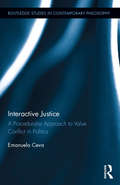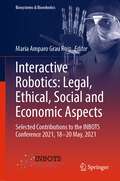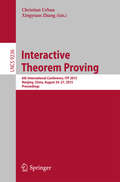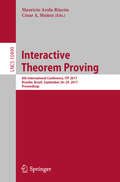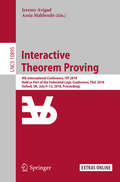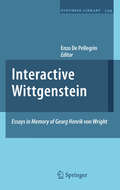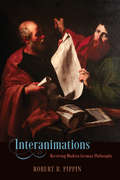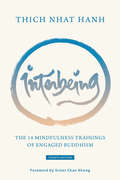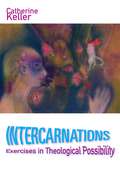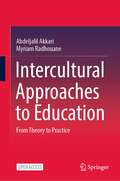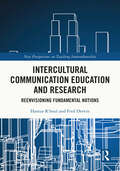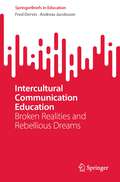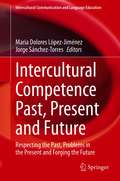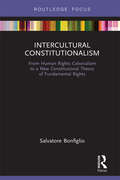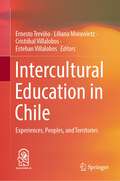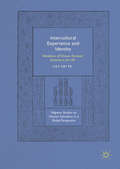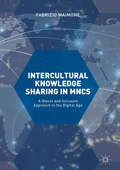- Table View
- List View
Intentionality as Constitution (Routledge Studies in Contemporary Philosophy)
by Alberto VoltoliniThis book develops a novel theory of intentionality. It argues that intentionality is an internal essential relation of constitution between an intentional state and an object, or between such a state and a possible state of affairs as subsisting.The author’s main claim is that intentionality is a fundamentally modal property, hence a non (scientifically) natural property in that it does not supervene, either locally or globally, on its nonmodal physical basis. This is the property, primarily for an intentional mental state, to be constituted by the entities it is about. In the case of intentionality of reference, such constituents are objects, in the sense of individuals; in the case of intentionality of content, such constituents are possible states of affairs as subsisting. Constitution is meant in a mereologically literal sense: those constituents are essential parts of the relevant states. As a result, the theory claims not only that intentionality is relational but also that it is an internal, essential relation holding between an intentional state and its object or proposition-like content.Intentionality as Constitution will be of interest to scholars and advanced students working in philosophy of mind, philosophy of language, metaphysics, and cognitive science.
Intentionality in Mulla Sadra (Studies in the History of Philosophy of Mind #24)
by Sümeyye ParıldarThis volume translates Brentano’s intentionality into medieval psychological and ontological discussions through Sadrian theories of sense perception and mental existence. Applying a new methodology, it reframes various parts of Sadrian theory around the problem of intentionality, which results in a refreshed reading of the philosopher Mulla Sadra. The book starts out by defining intentionality problem and discussing the historiography of Brentano’s conceptualization. It examines immateriality, content and aboutness, and sense perception. In its conclusion, the book claims that intentionality in Mulla Sadra combines ontological and psychological realities and that as a result of Sadrian monism, the intentionality, intentional object, the agent, and the reality are different versions of same reality.
Intentionality in Sellars: A Transcendental Account of Finite Knowledge (Routledge Studies in American Philosophy)
by Luz Christopher SeiberthThis book argues that Sellars’ theory of intentionality can be understood as an advancement of a transcendental philosophical approach. It shows how Sellars develops his theory of intentionality through his engagement with the theoretical philosophy of Immanuel Kant. The book delivers a provocative reinterpretation of one of the most problematic and controversial concepts of Sellars' philosophy: the picturing-relation. Sellars' theory of intentionality addresses the question of how to reconcile two aspects that seem opposed: the non-relational theory of intellectual and linguistic content and a causal-transcendental theory of representation inspired by the philosophy of the early Wittgenstein. The author explains how both parts cohere in a transcendental account of finite knowledge. He claims that this can only be achieved by reading Sellars as committed to a transcendental methodology inspired by Kant. In a final step, he brings his interpretation to bear on the contemporary metaphilosophical debate on pragmatism and expressivism. Intentionality in Sellars will be of interest to scholars of Sellars and Kant, as well as researchers working in philosophy of mind, epistemology, and the history of nineteenth- and twentieth-century philosophy.
Intentionality, Cognition, and Mental Representation in Medieval Philosophy (Medieval Philosophy: Texts and Studies)
by Gyula KlimaIt is commonly supposed that certain elements of medieval philosophy are uncharacteristically preserved in modern philosophical thought through the idea that mental phenomena are distinguished from physical phenomena by their intentionality, their intrinsic directedness toward some object. The many exceptions to this presumption, however, threaten its viability. This volume explores the intricacies and varieties of the conceptual relationships medieval thinkers developed among intentionality, cognition, and mental representation. Ranging from Aquinas, Scotus, Ockham, and Buridan through less-familiar writers, the collection sheds new light on the various strands that run between medieval and modern thought and bring us to a number of fundamental questions in the philosophy of mind as it is conceived today.
Intentionality, Deliberation and Autonomy: The Action-Theoretic Basis of Practical Philosophy
by Sandro NanniniMany important thinkers in the philosophical tradition, like Aristotle or Hume, have used an explicit theory of action as the basis of their respective normative theories of practical rationality and morality. The idea behind this architecture of theories is that action theory can inform us about the origin, bonds, reach and limits of practical reason. The aim of this book is to revive this direct connection between action theory and practical philosophy, in particular to provide systematic action-theoretical underpinnings for the discussion about the normative structure of practical reason. This book brings together a collection of specially commissioned essays from internationally prestigious scholars in the field and represents the state of the art in contemporary philosophy of action. The book is divided into three parts: i. conceptual work about what actions, intentions and intentional actions are; ii. empirical theory of practical deliberation; and iii.theories about the action theoretic features of autonomy. The volume significantly advances these three lines of research and offers important new contributions to each of them.
Intentions in Great Power Politics: Uncertainty and the Roots of Conflict
by Sebastian RosatoWhy the future of great power politics is likely to resemble its dismal past Can great powers be confident that their peers have benign intentions? States that trust each other can live at peace; those that mistrust each other are doomed to compete for arms and allies and may even go to war. Sebastian Rosato explains that states routinely lack the kind of information they need to be convinced that their rivals mean them no harm. Even in cases that supposedly involved mutual trust—Germany and Russia in the Bismarck era; Britain and the United States during the great rapprochement; France and Germany, and Japan and the United States in the early interwar period; and the Soviet Union and United States at the end of the Cold War—the protagonists mistrusted each other and struggled for advantage. Rosato argues that the ramifications of his argument for U.S.–China relations are profound: the future of great power politics is likely to resemble its dismal past.
Intentions: Negotiated, Contested, and Ignored (Literature and Philosophy)
by Arabella LyonThe relationship between an author's and an audience's intentions is complex but need not preclude mutual engagement. This philosophical investigation challenges existing literary and rhetorical perspectives on intention and offers a new framework for understanding the negotiation of meaning. It describes how an audience's intentions affect their interpretations, shows how audiences negotiate meaning when faced with a writer's undecipherable intentions, and defines the scope of understanding within rhetorical situations.Introducing a concept of intention into literary analysis that supersedes existing rhetorical theory, Arabella Lyon shows how the rhetorics of I. A. Richards, Wayne Booth, and Stanley Fish, as well as the hermeneutics of Hans-Georg Gadamer, fail to account for the complex interactions of author and audience. Using Kenneth Burke's concepts of form, motive, and purpose, she builds a more complex notion of intention than those usually found in literary studies, then employs her theory to describe how philosophers read Wittgenstein's narratives, metaphors, and reversals in argument.Lyon argues that our differences in intention prevent consistency in interpretations but do not stop our discussions, deliberations, and actions. She seeks to acknowledge difference and the communicative problems it creates while demonstrating that difference is normal and does not end our engagement with each other.Intentions combines recent work in philosophy, literary criticism, hermeneutics, and rhetoric in a highly imaginative way to construct a theory of intention for a postmodern rhetoric. It recovers and renovates central concepts in rhetorical theory—not only intention but also deliberation, politics, and judgment.
Intents and Purposes: Philosophy and the Aesthetics of Improvisation
by Eric LewisHow do we define improvised music? What is the relationship of highly improvised performances to the work they are performances of? How do we decide what are the important parts of an improvised musical work? In Intents and Purposes, Eric Lewis uses a series of case studies to challenge assumptions about what defines a musical work and musical performance, seeking to go beyond philosophical and aesthetic templates from Western classical music to foreground the distinctive practices and aesthetics of jazz. Pushing aside the assumption that composition and improvisation are different (or even opposed) musical practices, Lewis’s philosophically informed approach revisits key topics in musical ontology, such as how to define the triangle of composer-performer-listener, and the status of live performances in relation to scores and recordings. Drawing on critical race theory, feminist theory, new musicology, sociology, cognitive science, and genre theory, Lewis opens up new questions about agency in performance, as well as new ways of considering the historical relationships between improvisational practices with roots in different cultural frameworks. By showing how jazz can be both art, idea, and action all at the same time, Lewis offers a new way of seeing any improvised musical performance in a new culturally and aesthetically rich context.
Interactive Justice: A Proceduralist Approach to Value Conflict in Politics (Routledge Studies in Contemporary Philosophy)
by Emanuela CevaContemporary societies are riddled with moral disputes caused by conflicts between value claims competing for the regulation of matters of public concern. This familiar state of affairs is relevant for one of the most important debates within liberal political thought: should institutions seek to realize justice or peace? Justice-driven philosophers characterize the normative conditions for the resolution of value conflicts through the establishment of a moral consensus on an order of priority between competing value claims. Peace-driven philosophers have concentrated, perhaps more modestly, on the characterization of the ways in which competing value claims should be balanced, with a view to establishing a modus vivendi aimed at containing the conflict. Interactive Justice addresses an important question related to this debate: on what terms should the parties interact during their conflict for their interaction to be morally acceptable to them? Although largely unexplored by political philosophers, this is a main area of concern in conflict management. Building on a proceduralist interpretation of "relational" concerns of justice, the author develops a liberal normative theory of interactive justice for the management of value conflict in politics grounded in the fundamental values of fair hearing and procedural equality. This book innovatively builds a bridge between works in political philosophy and peace studies to propose a fresh lens through which to view the normative responses liberal institutions ought to give to value conflict in politics, and moves beyond the apparent dichotomy between pursuing end-state justice through conflict resolution or peace through conflict containment.
Interactive Robotics: Selected Contributions to the INBOTS Conference 2021, 18-20 May, 2021 (Biosystems & Biorobotics #30)
by María Amparo Grau RuizThis book reports on cutting-edge legal, ethical, social and economic issues relating to robotics and automation, human-machine interaction and artificial intelligence, in different application areas. It discusses important problems such as robotic taxation, social inequality, protection of neuro-human and children rights, among others. It describes current advances and challenges in robotic regulation and governance, as well as findings relating to sustainability of robotic industries, thus filling an important gap in the robotic and AI literature. Chapters consists of revised and extended contributions to the workshop session “Debate on legal, ethical & socio-economic aspects of interactive robotics” of INBOTS 2021, held virtually on May 18-20, 2021.
Interactive Theorem Proving
by Christian Urban Xingyuan ZhangThis book constitutes the proceedings of the 6th International Conference on Interactive Theorem Proving, ITP 2015, held in Nanjing, China, in August 2015. The 27 papers presented in this volume were carefully reviewed and selected from 54 submissions. The topics range from theoretical foundations to implementation aspects and applications in program verification, security and formalization of mathematics.
Interactive Theorem Proving
by Mauricio Ayala-Rincón César A. MuñozThis book constitutes the refereed proceedings of the 8th International Conference on Interactive Theorem Proving, ITP 2017, held in Brasilia, Brazil, in September 2017. The 28 full papers, 2 rough diamond papers, and 3 invited talk papers presented were carefully reviewed and selected from 65 submissions. The topics range from theoretical foundations to implementation aspects and applications in program verification, security and formalization of mathematical theories.
Interactive Theorem Proving: 9th International Conference, ITP 2018, Held as Part of the Federated Logic Conference, FloC 2018, Oxford, UK, July 9-12, 2018, Proceedings (Lecture Notes in Computer Science #10895)
by Jeremy Avigad Assia MahboubiThis book constitutes the refereed proceedings of the 9th International Conference on Interactive Theorem Proving, ITP 2018, held in Oxford, UK, in July 2018.The 32 full papers and 5 short papers presented were carefully reviewed and selected from 65 submissions. The papers feature research in the area of logical frameworks and interactive proof assistants. The topics include theoretical foundations and implementation aspects of the technology, as well as applications to verifying hardware and software systems to ensure their safety and security, and applications to the formal verication of mathematical results.Chapters 2, 10, 26, 29, 30 and 37 are available open access under a Creative Commons Attribution 4.0 International License via link.springer.com.
Interactive Wittgenstein
by Enzo De PellegrinThe philosophical thought of Ludwig Wittgenstein continues to have a profound influence that transcends barriers between philosophical disciplines and reaches beyond philosophy itself. Less than one hundred years after their publication, his early masterpiece 'Tractatus Logico-Philosophicus' and the posthumously published 'Philosophical Investigations' have emerged as two classic philosophical texts, each of which has elicited widely divergent readings and spawned contesting schools of interpretation. This collection of original essays by leading experts offers deep insights into the forces that shaped and influenced Wittgenstein's thought on a broad variety of topics. It also contains the text - in both the original German and an English translation by Juliet Floyd and Burton Dreben - of letters and cards sent to Wittgenstein by the philosopher and logician Gottlob Frege, which shed light on their interaction during the crucial period when Wittgenstein completed work on the 'Tractatus'. This important record of a philosophical friendship is complemented by a scholarly apparatus and an introduction. Other essays featured in this volume document and discuss Wittgenstein's thinking on music and religion as well as issues that take center stage in the 'Investigations' such as Wittgenstein's account of rule-following. The volume provides an invaluable research tool not only for students of the history of philosophy and for scholars of both Wittgenstein and Frege but also for anyone interested in the intellectual history of the first half of the twentieth century.
Interanimations: Receiving Modern German Philosophy
by Robert B. PippinIn this latest book, renowned philosopher and scholar Robert B. Pippin offers the thought-provoking argument that the study of historical figures is not only an interpretation and explication of their views, but can be understood as a form of philosophy itself. In doing so, he reconceives philosophical scholarship as a kind of network of philosophical interanimations, one in which major positions in the history of philosophy, when they are themselves properly understood within their own historical context, form philosophy’s lingua franca. Examining a number of philosophers to explore the nature of this interanimation, he presents an illuminating assortment of especially thoughtful examples of historical commentary that powerfully enact philosophy. After opening up his territory with an initial discussion of contemporary revisionist readings of Kant’s moral theory, Pippin sets his sights on his main objects of interest: Hegel and Nietzsche. Through them, however, he offers what few others could: an astonishing synthesis of an immense and diverse set of thinkers and traditions. Deploying an almost dialogical, conversational approach, he pursues patterns of thought that both shape and, importantly, connect the major traditions: neo-Aristotelian, analytic, continental, and postmodern, bringing the likes of Heidegger, Honneth, MacIntyre, McDowell, Brandom, Strauss, Williams, and Žižek—not to mention Hegel and Nietzsche— into the same philosophical conversation. By means of these case studies, Pippin mounts an impressive argument about a relatively under discussed issue in professional philosophy—the bearing of work in the history of philosophy on philosophy itself—and thereby he argues for the controversial thesis that no strict separation between the domains is defensible.
Interbeing: The 14 Mindfulness Trainings of Engaged Buddhism
by Thich Nhat HanhFormulated by Thich Nhat Hanh during the Vietnam War, the Fourteen Mindfulness Trainings of the Order of Interbeing are a penetrating expression of traditional Buddhist morality coming to terms with contemporary issues. In this new third edition, Thich Nhat Hanh introduces the term &“mindfulness trainings&” for &“precepts.&” Thich Nhat Hanh is a Zen master, scholar, and peacemaker. He was nominated by Dr. Martin Luther King, Jr., for the Nobel Peace Prize and is author of over thirty books, including Being Peace, Living Buddha Living Christ, and Teachings on Love. He is the founder of Plum Village, a meditation community in France that leads retreats on &“the art of mindful living.&”
Intercarnations: Exercises in Theological Possibility
by Catherine KellerIntercarnations is an outstanding collection of provocative, elegantly written essays—many available in print for the first time—by renowned theologian Catherine Keller.Affirmations of body, flesh, and matter pervade current theology and inevitably echo with the doctrine of the incarnation. Yet, in practice, materialism remains contested ground—between Marxist and capitalist, reductive and postmodern iterations. Current theological explorations of our material ecologies cannot elude the tug or drag of the doctrine of “the incarnation.” But what if we were to redistribute, rather than repress, that singular body? Might we free it—along with the bodies in which it is boundlessly entangled—from a troubling history of Christian exceptionalism?In these immensely significant, highly original essays, theologian Catherine Keller proposes to liberate the notion of the divine made flesh from the exclusivity of orthodox Christian theology’s Jesus of Nazareth. Throughout eleven scintillating essays, she attends to bodies diversely religious, irreligious, social, animal, female, queer, cosmopolitan, and cosmic, highlighting the intermittencies and interdependencies of intra-world relations. According to Keller, when God is cast on the waters of a polydoxical indeterminacy, s/he/it returns manifold. For the many for whom theos has become impossible, Intercarnations exercises new theological possibilities through the diffraction of contextually diverse multiplicities.A groundbreaking work that pulls together a wide range of intersecting topics and methodologies, Intercarnations enriches and challenges current theological thinking. The essays reach back into feminist, process, and postcolonial discourses, and further back into messianic and mystical potentialities. They reach out into Asian as well as inter-Abrahamic comparison and forward toward a political theology of the Earth, queerly entangling climate catastrophe in materializations resistant to every economic, social, and anthropic exceptionalism. According to Keller, Intercarnations offers itself as a transient trope for the mattering of our entangled difference, meaning to stir up practices of a better planetarity. In Intercarnations, with Catherine Keller as their erudite guide, readers gain access to new worlds of theological possibility and perception.
Intercultural Approaches to Education: From Theory to Practice
by Abdeljalil Akkari Myriam RadhouaneThis open access book provides an analysis of contemporary societies and schools shaped by cultural diversity, globalization and migration. This diversity is necessarily reflected in education systems and requires the promotion of intercultural approaches able to improve learning processes and the quality of education. From an international and comparative perspective, this book first presents theoretical and conceptual foundations for seriously considering cultural diversity. The book also compares intercultural approaches and debates generated in countries as diverse as the United States, Canada, Brazil, Switzerland and France. For each national context, the book addresses both the historical roots of intercultural approaches and the concrete initiatives driven by educational policies for their implementation in schools and classrooms. Finally, the book presents discussions surrounding the treatment of linguistic or religious diversity in schools, the emergence of global citizenship education and the key role of teachers in intercultural approaches.This is an open access book.
Intercultural Communication Education and Research: Reenvisioning Fundamental Notions (New Perspectives on Teaching Interculturality)
by Fred Dervin Hamza R'boulSeeking to uncover underlying epistemic invisibilities in generating intercultural communication education and research knowledge and to open up space for envisaging interculturality alternatively, this book reexamines and problematizes the assumptions and ontologies in the conceptual systems of interculturality. In enunciating and critiquing what has been largely endorsed, normalized and taken for granted, this volume brings to the fore different, changing and situated understandings of intercultural ontologies and epistemologies in terms of premises, workings and objectives, unveiling the entangled factors and contexts that have delimited and circumscribed the realm. The authors believe that the field would benefit from some cognitive and sensory dissonance while reengaging effectively with notions to move forward. In particular, they endeavour to de-monumentalize and disrupt the very conceptual tenets that may have rendered interculturality myopic, repetitive, monolithic and aseptic in expanding the epistemic concerns of the “intercultural”, especially in the English language. This book will be an essential read for scholars and students of the sociology of education, educational philosophy and intercultural education and also for all readers interested in the broad field of interculturality.
Intercultural Communication Education: Broken Realities and Rebellious Dreams (SpringerBriefs in Education)
by Fred Dervin Andreas JacobssonThis book explores the notion of interculturality in education and supports scholars in their discovery of the notion. Continuing the author’s previous work, the book urges (communication) education researchers and educators to 'interculturalize' interculturality. This book corresponds to the authors’ endeavor to complexify the way interculturality is discussed, expressed, (co-)constructed and advocated in different parts of the world and in different languages. To interculturalize interculturality is to expand the way we deal with the notion as an object of scientific and educational discourse, noting the dominating voices and allowing for silenced voices that are rarely heard around interculturality to emerge. This book is based on broken realities and (the authors’) rebellious dreams. As two researchers and educators with a long experience examining discourses of interculturality, this book represents the authors’ program for the future of intercultural communication education. The book is divided into three 'tableaus' (living descriptions) depicting today’s 'broken' realities of interculturality and two 'rebellious' dreams of what it could be in research and education.
Intercultural Competence Past, Present and Future: Respecting the Past, Problems in the Present and Forging the Future (Intercultural Communication and Language Education)
by María Dolores López-Jiménez Jorge Sánchez-TorresThis book explores the benefits of teaching reflection upon one’s own culture to develop intercultural competence and looks into the relationship between the proficiency level of the second language and the target culture. It introduces new debates on the concept of ‘critical cultural awareness’ in intercultural learning and teaching, for example the indiscriminate use of terminologies related to the idea of ‘intercultural encounters’. Also, it provides insight into the relationship between language and culture using a new tool such as the Autobiography of Intercultural Encounters through Visual Media. The presentation of different approaches, tools, barriers, educational and cultural realities, online intercultural exchange projects and concepts such as motivation, attitudes, stereotyping, otherization, and critical cultural awareness makes this book an excellent instrument not only for teachers but also for researchers, policy-makers and private and public institutions that want to explore culture and interculturality and to promote an intercultural competence and global citizenship among its learners / users / clients and / or an interculturally-oriented language education.
Intercultural Constitutionalism: From Human Rights Colonialism to a New Constitutional Theory of Fundamental Rights
by Salvatore BonfiglioThis book argues that the effective protection of fundamental rights in a contemporary, multicultural society requires not only tolerance and respect for others, but also an ethics of reciprocity and a pursuit of dialogue between different cultures of human rights. Nowadays, all cultures tend to claim an equitable arrangement that can be articulated in the terms of fundamental rights and in the multicultural organization of the State. Starting from the premise that every culture is and always was intercultural, this book elaborates a new, and more fundamentally, pluralist view of the relationship between rights and cultural identity. No culture is pure; from the perspective of an irreducible cultural contamination, this book argues, it is possible to formulate constitutional idea of diversity that is properly intercultural. This concept of intercultural constitutionalism is not, then, based on abstract principles, but nor is it bound to any particular cultural norm. Rather, intercultural constitutionalism allows the interpretation of rights, rules and legal principles, which are established in different contexts.
Intercultural Education in Chile: Experiences, Peoples, and Territories
by Ernesto Treviño Liliana Morawietz Cristóbal Villalobos Esteban VillalobosThis book examines the status of intercultural education in Chile. It does this through three axes: the first is multidisciplinary, including historical, anthropological, sociological, and pedagogical, to account for varied aspects of the Chilean intercultural education. The second is the consideration of multiple indigenous peoples, analyzing students’ groups or indigenous peoples, such as the Rapa Nui, Aymara, or Mapuche. Finally, the book has a multilevel perspective that recognizes that educational policy involves different actors, from the central government to local communities.The book incorporates study material enriched with the experience and analysis of different perspectives and methodologies of its authors, being useful for understanding intercultural education in the country. It is a versatile resource for understanding this topic, as well as a support for the development of programs and policies.Translation from the Spanish language edition: Educación Intercultural en Chile. Experiencias, pueblos y territorios by Ernesto Treviño, et al., © Ediciones UC 2017. Published by Ediciones UC. All Rights Reserved.
Intercultural Experience and Identity: Narratives of Chinese Doctoral Students in the UK (Palgrave Studies on Chinese Education in a Global Perspective)
by Lily Lei YeThis book examines the identity formation and negotiation of Chinese doctoral students in the UK, and the opportunity for self-transformation this experience offers. As the largest group of international students in the English-speaking world, Mainland Chinese students encounter a range of difficulties and prospects that may be relevant to the wider international student community. Using extensive qualitative and empirical data, the author explores the narratives of eleven Chinese doctoral students at two British universities through a sociological perspective. Balancing analysis with solid theoretical framework and the voices of the students themselves, the author moves away from essentialism and ‘othering’, instead shining a light on the effects of globalisation, internationalisation and recent policy strategies. This volume will be of interest and value to students and scholars of comparative and international education, identity formation, intercultural communication, the sociology of education and study abroad.
Intercultural Knowledge Sharing in MNCs
by Fabrizio MaimoneThis book provides a systematic view of current and future research perspectives on intercultural knowledge sharing and offers a model for the growth of organizational knowledge in the digital age. The author puts forward multidisciplinary and multi-paradigmatic approaches to offer an updated view on the best practices towards international management. With insights on the opportunities and limitations of the use of digital and social media to facilitate intercultural knowledge sharing in business, the book explores the evolution of research on the topic, taking into account the consequence of "glocalization" as well as technological innovation and the evolution of organizational strategies and structures. Intercultural Knowledge Sharing in MNCs will be of use to scholars of management and organizational studies, as well as managers of international businesses interested in knowledge sharing, as it delivers an invaluable model which aims to conciliate diversity and inclusion, global and local knowledge, technological innovation and humanism.
